
Volume XXXII | Feb. 13, 2025
sentinel of black and marginalized voices at N.C. State since 1992.


Volume XXXII | Feb. 13, 2025
sentinel of black and marginalized voices at N.C. State since 1992.
How the demise of DEI affects NC State
6 WELCOME TO THE DIRTY
Key players in Southern hip-hop
9 BLACK HISTORY MONTH GALLERY
Students model for southern hip hop photoshoot
12 THE GRAMMY'S IS BLACKER THAN EVER
Doechii, Kendrick, Beyoncé — enough said!
Only with the permission of our elders do we proudly produce each edition of The Nubian Message:
Dr. Yosef ben-Yochannan, Dr. John Henrik Clark, Dr. Leonard Jeffries, The Black Panther Party, Mumia A. Jamal, Geronimo Pratt, Tony Williamson, Dr. Lawrence Clark, Dr. Augustus McIver Witherspoon, Dr. Wandra P. Hill, Mr. Kyran Anderson, Dr. Lathan Turner, Dr. M. Iyailu Moses, Dokta Toni Thorpe and all those who accompany us as we are still on the journey to true consciousness.

314 Witherspoon Student Center, NCSU Campus Box 7318, Raleigh, NC 27695 office 919-515-1468 advertising 919-515-2411 online thenubianmessage.com

“The revolution will be televised. You picked the right time, but the wrong guy” — or maybe the wrong Editor-in-Chief.
Black History Month is finally here, and while the world might not always celebrate us, The Nubian Message is here to honor Black excellence — all the time! Welcome to the Dirty South!
We’ve curated a jewel-studded gallery and an incredible lineup of articles, including a deep dive into the history of Southern hip-hop. In our opinion section, find out why staff writer Emma Hamrick can’t stand the Super Bowl, and why Ross Emelle is calling out the lack of support for public schools. We also explore the U.S. immigration policy crisis with an insightful interview featuring an attorney from student legal services. There’s no shortage of powerful content in this issue.
to never let them steal your joy!
Editor-In-Chief
Alianna Kendall-Brooks nubian-editor@ncsu.edu
Managing Editor
Isaac Davis
nubian-managingeditor@ncsu.edu
Photo Editor
Kaela Belingon
Multimedia Editor
Harris

Shaere Delgiudice News Editor
Despite being in the early stages of his second term, President Donald Trump has already made significant overhauls to U.S. immigration policy, raising concerns among many immigrant communities.
The Nubian Message highlighted some of these updated policies and Executive Orders and spoke to the immigration attorney for University Student Legal Services at NC State to discuss the legal standing of these changes, what undocumented students can do and what resources exist.
One major change the Trump administration made was rescinding the Biden administration policy on “protected areas.” This entailed that enforcement actions, such as arrests, should not be taken in or near areas that provide essential services, including schools, healthcare facilities, places of worship, playgrounds and foster care facilities, domestic violence shelters, disaster relief centers and more. While certain school districts have tried to restrict ICE agent entry, these policies are dependent on the facilities themselves, who “have only so much discretion.”
Trump also announced plans to expand the U.S. naval base facility at Guantanamo Bay to hold 30,000 immigrants. He said of those he would be deporting, “Some of them are so bad, we don’t even trust the countries to hold them because we don’t want them coming back,” raising questions about the length migrants would be held for.
Additionally, this move raised concerns over immigrant’s rights, as the facility is most well-known for housing suspected terrorists, some of whom never received a trial.
On his Inauguration Day, Trump issued an Executive Order intended to end birthright citizenship. Immediate lawsuits from the American Civil Liberties Union, among others, followed. The order was blocked by two federal judges. However, the legality of this is likely to be disputed for quite some time.
Hoang Lam, an Immigration Attorney for University Student Legal Services at NC State, said one of the hardest parts of his job
is that “processing times for a lot of cases are taking longer,” which puts people’s lives on hold and creates a lot of uncertainty.
He pointed to an example of a student asylum-seeker, whose government tried to wrongfully arrest and prosecute her. This student did not receive an asylum interview for nearly seven years, leading their office to file a lawsuit against the federal government, which they won. Her case was thankfully approved in December but Lam added that he imagines “there are many other students here too in that situation,” or similar cases.
Due to processing times, Lam recommends students explore and file for any immigration benefits they may be eligible for as soon as possible and pay close attention when filling out applications during Trump’s first term they could get rejected for things as simple as leaving questions that did not apply to them blank instead of putting “not applicable.”
When asked about the specific policy changes and statements made by the Trump administration, Lam first addressed the promise of mass deportation, saying, “whether the government can detain all the people they want is questionable,” as “it would likely require local law enforcement and [state] government cooperation.”
Lam also spoke about the detention facility in Guantanamo Bay, sharing that he had previously done deportation defense work. Detainee cases from North Carolina are actually heard in the Stewart Detention Center in Lumpkin, Georgia, as the immigration court in Charlotte only does non-detainee cases.
Lam pointed out some of the challenges that come with this, saying that this detention center is quite remote, making it, “very difficult for [families] to visit and for attorneys to meet with their clients and prepare the case.”
“So imagine Guantanamo: how are attorneys going to get there?” he said, adding that he expects legal challenges. When asked how he sees the move to end birthright citizenship playing out, Lam said he anticipates, “that the courts will all deny,” this executive action.
Another move Trump has proposed, canceling the visas of students who participated in pro-Palestinian protests. Lam says while the legality of this move “definitely is a gray area,” he adds that the administration could rely on the Supreme Court case, Kleindienst v. Mandel, to argue precedent, saying, “I think it will be
challenged and litigated. I just don't know what the outcome would be.”
Lam said there has been an increase in both undocumented students and students whose parents are undocumented seeking the office’s help. One situation he highlighted was the administration’s move to terminate temporary protective status for Venezuelans, setting them to expire in April. This move left students in an anxious limbo and while he says, “some are able to possibly get other immigration options so that they could continue to live, study and work here,” he adds that “some might not have those options and are subject to the deportation [order].”
He recommends that even students with valid visas who are, “on a list of countries that were subject to previous travel bans or countries that have not cooperated with the administration in terms of accepting deportees,” consider not leaving the U.S. Lam pointed to instances of Iranian students with valid visas who left during Trump’s first term and were turned away by U.S. airports when trying to return.
He said, “Immigrant students, and even U.S. citizen students with immigrant families, should be concerned. They should try to learn as much as they can about any immigration developments. They should consult with immigration attorneys, whom they trust, and although this is an anxiety-provoking period of time, the more prepared they are, the more likely they can weather through the next four years.”
Lam also adds that he unfortunately “would have to advise students to be more discreet in how they express their views on social media and with the press because anything that they say can be interpreted as against America or having views that are against American foreign policy.”
He said people should litigate any delay or denial of their case and mentioned that some immigration rules have to go through a public comment period during which the agency has to review every comment submitted. He encouraged students to try and lobby against any rules adverse to immigrants if they can, as it will take longer for these rules to go into effect.
Speaking to students with undocumented family members specifically, Lam said, “They should know their rights, including the right to remain silent.” He added that they do not have to allow immigration authorities into their home without a judicial warrant and do not have to state where they were born, or their citizenship
status. He recommends undocumented people have contingency plans and let loved ones know where they are in the event that they are detained. He said “They should explore immigration options in other countries,” as well.
Finally, Lam said, “Our office provides legal services for students for free,” adding that they are, “One of the few University Student Legal Services offices that have an immigration attorney on staff, so we are here for them.”
Some of the services Lam’s office assists with include helping students who are citizens with undocumented parents prepare the Power of Attorney in the event that their parents are detained and deported, allowing the students to take care of their parents' finances and any siblings under 18.
Additionally, they help students apply for green cards, citizenship, change of status and, “basically any immigration area except for employment petition related to the green card process based on someone’s skills.”
Lam provided a list of non-profit immigration service providers in North Carolina.
The resources for Wake County are: Apex Immigration Services, Justice Matters in Raleigh, North Carolina Justice Center, University Student Legal Services and The U.S. Committee for Refugees and Immigrants’ North Carolina office.
In Durham County: Justice Matters also has an office, along with Church World Service and World Relief. For Orange County: UNC School of Law Immigration Clinic and the Refugee Support Center.
Additionally, Legal Aid’s Immigration Pathway for Victims and Elon Law School’s Humanitarian Immigration Law Clinic serve anyone in all 100 North Carolina counties.
For the full list of resources outside of the Triangle as well as a breakdown of the services and contact information for each, please visit thenubianmessage.com.

Isaac Davis Managing Editor
On May 23, 2024, the UNC System Board of Governors repealed the policy on Diversity, Equity and Inclusion and replaced it with Section 300.8.5 titled “Equality Within the University of North Carolina.” The bill prohibits institutions from taking official stances on political controversies or engaging in “activities that could be interpreted as political activism,” per the committee report.
On Jan. 20, 2025, NC State’s Student Senate Standing Committee on Diversity, Inclusion and Outreach (DIO) compiled a report in response to the bill, detailing NC State’s compliance and its impact on the campus community. The Student Senate voted to endorse this report.
The Equality Within the University of North Carolina report further codifies the changes, prohibitions and requirements outlined in Senate Bill 195 (S195), which passed through the North Carolina General Assembly in 2023.
Specifically, Section 300.8.5 restricts the promotion of any viewpoints that could be considered politically charged by “prohibiting the endorsement, funding or hosting” of programs that could suggest the university supports either side of a controversial debate.
The DIO committee suggests that S195
and Section 300.8.5 are parts of broader pushes to define and enforce what their report refers to as “institutional neutrality.”
The report references the University of Chicago’s Kalven Committee Report of 1967 which proclaims that for a university to perform its mission to society it must, “sustain an extraordinary environment of freedom of inquiry and maintain an independence from political fashions, passions and pressures.”
However, as the diversity subcommittee argues, a university committed to neutrality that eliminates or reduces its DEI-focused resources is “less able” to fulfill its mission.
“The negative impacts [will] continue to be seen on the students and their success as a result of the repeal of Regulation on Diversity and Inclusion Within the University of North Carolina,” said the report.
NC State University submitted its own report on how it would comply with Section 300.8.5, notably eliminating eight jobs and realigning 29 others across all levels of the university. Additionally, the university renamed its Office of Institutional Equity and Diversity (OIED) to the Office of Equal Opportunity (OEO). Further, the university has suspended all DEI-related training that is not explicitly required by law. Changes also include moving the Disability Resource Office
(DRO) from the Division of Academic and Student Affairs (DASA) to the Office of Equal Opportunity. The Student Success Centers, formerly the Campus Community Centers under OIED, were moved under DASA.
The DIO affirms that the centers will remain open for students to use their resources and attend center-sponsored events. Still, they suggest that the transitions will strain DASA, its staff and their ability to allocate resources to the centers. The excess strain could create skepticism about whether the centers’ remaining resources will withstand the policy changes.
The DIO report argues that DEIfocused centers are critical to student success, specifically for marginalized and underrepresented students. They say the reduction and realignment of DEI-based offices disrupt the support that the centers provide, emphasizing that students may struggle to find similar levels of support following the elimination of specific dedicated resources. “This change may result in a gap for those who depend on these offices for success inside and outside of the classroom, individual representation and personal guidance, potentially affecting their academic engagement and overall sense of belonging within their institution,” the report said.
Another harrowing impact of Section 300.8.5 is eliminating the UNC System requirements to instate “Diversity and Inclusion (D&I) activities” at all institutions. Section 300.8.5 removes funding for such activities, redirecting their budgets to existing or restructured programs. According to the DIO, NC State reports saving $4,909,053 by eliminating DEI-related programs and job positions. In total, the UNC System reports saving $17,118,889 since the elimination and realignment began.
The DIO is particularly concerned with how the new restrictions could stifle student discussions surrounding diverse, controversial topics. According to their report, “students may feel discouraged from organizing or attending events that address race, gender and social justice issues.” The report continues, stating that the restrictions force student organizations to navigate the limitations of institutional support. Organizations must now make strategic decisions about how they brand and communicate events (such as advocacy, protests and forums) that may conflict with institutional neutrality.
Although Section 300.8.5 aims to deconstruct community pillars and reconstruct profits, DIO defends NC State’s remaining critical resources.


Kaela belingon
Photo Editor
“Is a threat not a promise?”
Abel Tesfaye, the superstar performer known as The Weeknd, asks in his sixth studio album, a swan song project that puts his absolution in front of all the world to see.
The journey of his latest trilogy began nearly five years ago when he released “After Hours,” the album that gave us the diamond-certified single “Blinding Lights.” Both the song and the album topped global charts in 2020, receiving critical acclaim and solidifying The Weeknd as a worldwide superstar.
Despite his success, he received no Grammy Awards nominations in 2020 to the shock of many, including Tesfaye himself. Shortly after nominees were announced, he called the show “corrupt” and boycotted it in a move that would change the trajectory of the show forever.
This year at the 67th Grammy Awards Show, The Recording Academy’s CEO Harvey Mason Jr. apologized to The Weeknd in a speech, announcing “the Grammy electorate is now younger, nearly 40% people of color.” Afterwards, he welcomed Tesfaye to the stage for a surprise performance.
His boycott successfully brought the change many wanted to see within the show and the academy.
Turning back to the trilogy, the sequel album “Dawn FM” followed in 2022. While it didn’t chart as well as its predecessor, the album received even greater praise from music critics.
It’s clear through the two albums that The Weeknd is no stranger to being vulnerable in his music. He’s been doing this since the start of his career, not shying away from his lived experiences of being a high school dropout who grew into a global superstar.
But his work is about more than just his struggles with hedonism, heartbreak and hopelessness. He looked down at us in “After Hours” with a toxic, selfhating loverboy theme, then met us at eye-level with the existentialist radio station of “Dawn FM,” painting a story of a man seeking absolution, caught in the exacerbating storm of larger-than-life stardom.
And on Jan. 31, 2025, The Weeknd looked up, reached out for his absolution and found it welcoming him with open arms. “Hurry Up Tomorrow” is an album
that doesn’t just serve as the trilogy’s finale, but the finale of The Weeknd’s story as we know it.
“ 'Hurry Up Tomorrow' is an album that doesn’t just serve as the trilogy’s finale, but the finale of The Weeknd’s story as we know it. ”
Although Tesfaye knew death was always close by, his story doesn’t end in death. This lament is clear in songs like “After Hours” and “Gasoline” from the trilogy’s first and second installments respectively. Instead, it ends in the abandonment of all the character of The Weeknd stands for: living the high life as he disregards death–and even, at times, seeks it.
But death doesn’t come in a literal sense. “Hurry Up Tomorrow” gives The Weeknd a death of personality.
Much like his previous works, the album is best listened to in order, and it brings everything we can expect and more, not just because it’s a double album with 22 tracks and three bonus songs. His smooth vocals are stunning over the sophisticated, high-energy production as he delves into new genres like Brazilian funk in “Sao Paulo” and trap in “Timeless,” both album singles he released in 2024.
Furthermore, “Hurry Up Tomorrow” is more cinematic than commercial, sometimes even disorienting, though for good reason. It serves as a soundtrack for The Weeknd’s upcoming psychological thriller of the same name. A trailer released on Feb. 4 appears to align the movie’s plot with the story across the album.
The expected themes of love and pain show up, but it adds religion and draws upon The Weeknd’s Ethiopian heritage, though most lyrics remain self-explanatory to casual listeners.
His live performance attire is an Ethiopian kaba of black and gold. In an album teaser posted Aug. 6, 2024, The Weeknd visualized himself as a young child, wearing a traditional white and gold Ethiopian garment, looking at reflections from various eras in his music career as the storm rolls in and consumes the last image
of a young Tesfaye in his loving mother’s arms.
The teaser brings the story of the album to life as he searches his past, present and future while struggling between fame, legacy and identity when facing the enda message clear from the first song, “Wake Me Up.”
The opening track is a doomed man’s plea, starting with an ominous mixture of muffled strings and the irregular beat of a heart as The Weeknd’s reverberated voice sings: “No afterlife, no other side / I’m all alone when it fades to black.” Then the song shifts into a groovy 80’s sound, the lyrics expressing how he’s running out of time as his demons catch up to him.
“Cry For Me” follows after a smooth transition between songs, a gimmick present throughout The Weeknd’s trilogy of albums. Atlanta producer Metro Boomin’s production shines in the sharp and synth-heavy track, while The Weeknd’s sweet falsetto contrasts the gritty and industrial energy that emphasizes his pain and desperation in realizing his relationship with his lover is coming to an end.
“ The opening track is a doomed man’s plea, starting with an ominous mixture of muffled strings and the irregular beat of a heart as The Weeknd’s reverberated voice sings: 'No afterlife, no other side / I’m all alone when it fades to black.' ”
The slower, solemn “Baptized In Fear” parallels The Weeknd’s own drowning at his baptism while a shadow haunts him, representing his present guilt, sin and regret. A seamless transition introduces “Open Hearts” and pulls him out of the tub and into the vulnerability of infatuation with the electropop track’s chorus of starry synthesized keys making you feel like you’re not just falling in love, but flying in it.
“Reflections Laughing” is perhaps the
most harrowing song on the album, made even darker by its deceptive beauty. It starts with a gentle guitar and echoing laughter before the gospel-like chorus begins: “Don’t you let me down / If you let me drown / I’ll die in your arms again / …When they take my crown.” Halfway through the song, a telephone rings, and a lover’s voice, distorting as The Weeknd consumes pills and alcohol, begs him: “Don’t let the industry break you, baby / Don’t let them take you from me.”
The album isn’t all depressing though, with lighter, hopeful R&B tracks like “I Can’t Wait To Get There” and “Give Me Mercy” putting a spin on gospel with the use of synths. In “I Can’t Wait To Get There,” Tesfaye reflects on how far he’s come since dropping out of high school.
“Red Terror,” intense and passionate, at first seems out of place, with Tesfaye singing to comfort a child and apologizing to a mother as if he was the father who had abandoned his family.
“Alone I left, to the west / Then moved to the city… / You came out so precious, in the snow, you would grow / your mama loves you, you’ll never be alone.”
The Weeknd’s distorted voice follows, reciting “Death Is Nothing At All,” a Henry Scott Holland poem, to himself, separating the man and his alter ego like a mirror separates him from his reflection: “What we were to each other, that we are still / Call me by the old, familiar name.”
The song is a cornerstone in Tesfaye’s story of The Weeknd and is named after a violent politicide in late 1970s Ethiopia. The lyrics draw parallels to The Weeknd’s parents, Ethiopian immigrants who moved to Canada and had a child, Tesfaye himself.
“Red Terror” is also a turning point in the album as The Weeknd and Tesfaye realize they will always be one and the same as they look towards the future, without turning back.
The final song, “Hurry Up Tomorrow,” is an angelic and pure track; he forgives his past, accepts his fate and holds out hope for the future.
It’s an ending that has been a long time coming. The journey of sin and misery is finalized by forgiveness and hope, reaching out for healing at last. This is the end of The Weeknd, free from death’s grip, bathed in Heaven’s light.
“So I see Heaven after life / I want Heaven after life / I want to change, I want the pain / No more, no more, no more.”

Hernández Staff Writer
Hip-hop, a cultural revolution from the Bronx, NY – is characterized by the rise of Djing, emceeing, beatboxing and B-boying. The musical genre became a way of expressive storytelling, fiercely molded by regional rivalries.
The height of feud culture can be pinpointed to 1994-1997 between Bad Boy records in the East and Death Row Records on the West Coast. While at each other's throats the hip-hop community was not only captivated, but unwilling to recognize the talent taking root in a third region.
Throughout the 1980s, the South was looked down on by other regions and often made fun of. The Southern lifestyle was seen as country and many equated Southerners with being intellectually inferior. Regardless, the South was cooking up their own sound, waiting for the opportunity to make it out. It’s about time to reintroduce y'all to the Dirty South and its lasting legacy on hip-hop.
Miami
When hip-hop hit Miami, it took the form of Miami bass — a subgenre characterized by a repetitive call-andresponse structure with heavy bass and synthesizers. Miami bass reshaped Miami’s club scene and often incorporated Cuban, Haitian and other Caribbean sounds reflecting the immigrant communities present in Florida.
Luther Cambell, otherwise known as ‘Uncle Luke,’ is credited with bringing Miami Bass to mainstream music.
Uncle Luke was one of the founding members of the hip-hop group 2 Live Crew. Known for their sexually explicit content, 2 Live Crew was heavily criticized by conservatives. Many claimed 2 Live Crew’s music was unsuitable for young people. As the leader of the group, Luke pushed the boundaries of what was deemed acceptable in lyricism. Following the release of their 1989 album “Nasty As They Wanna Be,” Boward County Sheriff, Nick Navarro, filed obscenity charges against the record. Navarro would go on to obtain a probable cause ruling, eventually leading to an official obscenity ruling from the federal court. “Nasty as I Wanna Be” became the first record in American history to be deemed obscene on a federal level. The ruling allowed for the police to seize all of 2 Live Crew’s records and permitted
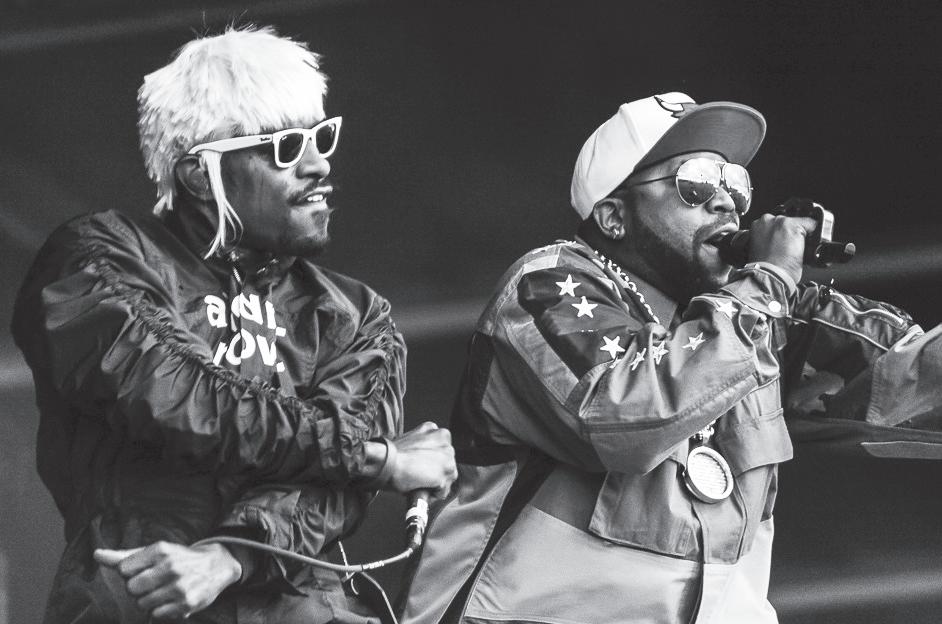
the arrest of any of the group’s members if they performed their music. Despite the threat of jail time, 2 Live Crew would go on to perform, which ultimately landed them back in the courtroom. After being acquitted, Uncle Luke once again fought back against the initial obscenity ruling.
“ This ain’t about me. This ain’t about 2 Live Crew. It’s about Hip-Hop… I know if I leave this case on the books, that it will be no other rapper able to sing explicit lyrics.” he said.
And he succeeded. The 11th Circuit Court overturned the ruling and deemed “As Nasty as They Wanna Be” to be protected under the First Amendment.
Down in Houston, hip-hop took an entirely new form gaining a reputation as “The City of Syrup”. DJ Screw, the pioneer of Screwed and Chopped, was taking hip-hop to a new tempo. Known for the psychedelic feeling his music evoked, “Screw started a revolution,” DJ Michael “5000” Watts – a contemporary of Screw –said, “He slowed it down and chilled it out when all the other cats were trying to go faster, harder.”
Similarly to Uncle Luke in Miami, the Geto Boys in Houston were also pushing the boundaries of acceptable lyricism. Using the ‘syrup’ style developed by DJ Screw, the Geto Boys often spoke of violence and dark subject matter. “The Dirty South” itself
was a term initially used by the Geto Boys and eventually adopted by the rest of the South.
The Memphis scene really began with DJ Spanish Fly. Known for electro, 808 heavy beats, Fly’s music tended to adopt dark and menacing undertones that were further developed by DJ Squeeky. Their sound completely revitalized the Memphis club and roller rink scenes, leading to the creation of Buck — a blend of soul, funk and gospel, associated with dance styles such as jookin’ and stomping.
As Squeeky’s beats gained traction, he became the go-to producer for local MCs such as 8Ball and MJG, Kingpin Skinny Pimp, Tom Skeemask, and Criminal Manne. He also heavily influenced the hiphop group Three 6 Mafia.
Today, Atlanta is the epicenter of all things hip-hop, but it wasn’t always that way. It all begins with hip-hop duo Outkast. At the 1995 Source Awards held in New York, Outkast won Best New Rap Group following the release of their album “Southernplayalisticadillacmuzik.”
Met with a crowd of boos from the audience, Andre3000 and Big Boi took to the stage to accept their award. While Big Boi kept his speech cordial, Andre3000
addressed the disrespect head-on, “It's like we got a demo tape, but don’t nobody wanna hear it, but it's like this: The South got something to say. ”André 3000’s acceptance speech became a catalyst for Southern artists to truly break into mainstream hip-hop on a global scale. Southern hip-hop artists have a unique perspective. Living through the aftermath of the confederacy, Southern hip-hop told a story of perseverance and unity. What made Atlanta particularly stand out was the camaraderie and family amongst artists. This is most notable with Rico Wade and his production trio Organized Noize, who would host Atlanta’s up-and-coming artists in his mother’s unfinished basement. This conglomerate of artists would come to be known as the Dungeon Family.
Jimmy Brown recalls his son, Sleepy Brown’s, time at the dungeon, “They would go there, they would record, they would go to sleep there. They wake up, they eat and then start recording again.” There would be no Goodie Mob, OutKast, Killer Mike, Janelle Monáe or Future as we know them today without Organized Noize and the Dungeon Family. Known for their lack of sampling, Organized Noize prided themselves in making their own sound and collaborating with artists to create every musical element whether it be for keys or vocals.
When Outkast gained recognition for “Southernplayalisticadillacmuzik,” it was a win for the entire family, because everyone was featured to some capacity on it.
“That first Album was everybody’s album. Everything that everyone had learned in their individual things, put into one pot,” said Sleepy Brown.
The idea was that once one of them got recognition, it was only a matter of time before they all made it. This mentality would prove to become a cornerstone of the Dungeon Family’s success and ultimately put Atlanta on the map.
The influence of Southern Hip-hop can be felt in every facet of modern day hip-hop. Uncle Luke and the Geto Boys have opened doors for all hip-hop artists regarding censorship. DJ Screw, DJ Spanish Fly and Organized Noize have revolutionized production. From Bounce to Buck, Crunk to Trap, The Dirty South has diversified hip-hop, leaving a legacy that can still be heard today.

Nevaeh sturdiviant Correspondent
The Black community has unlimited potential. Yet, we internalize societal stereotypes that limit our capabilities, to measure our intelligence and identity. These societal stereotypes do not just affect how others see us – but how we see each other. It creates divisions that leave Black people uncomfortable in their own community, judged for being “not black enough.” Even a Black person's so-called “Blackness” is being put on a scale and weighed between whitewashed and culturally Black. Let’s talk about that. This is a learned divide. Generational systematic oppression has shaped the way the Black community defines itself, and these racist ideologies were never abolished with slavery or washed away after the Civil Rights Movement.
In an article titled, “How Have Social Stereotypes Changed over the Last Century?” published by Kellogg Insight of Northwestern University, says, “‘You can think of some archetypal examples of how our stereotypes of Black Americans have changed over time, from lazy in the 1900s to helpless in the 1990s.” The article continues, “It’s a different word, but it’s got the same meaning of incompetence and negativity.”
These stereotypes still hold ground and have simply transformed into something tolerable for modern society. The division within our community is not accidental — +it is the direct consequence of history that weakens us in the name of being “Black.”
“ The division within our community is not accidental —it is the direct consequence of history that weakens us in the name of being 'Black.' ”
They persist in our modern struggles: poverty, gentrification, coded racism and more. We as a community can perpetuate them under the strain of further division. So, it’s time to redefine Black. The Black community has endured a long, oppressive history. That history has bled
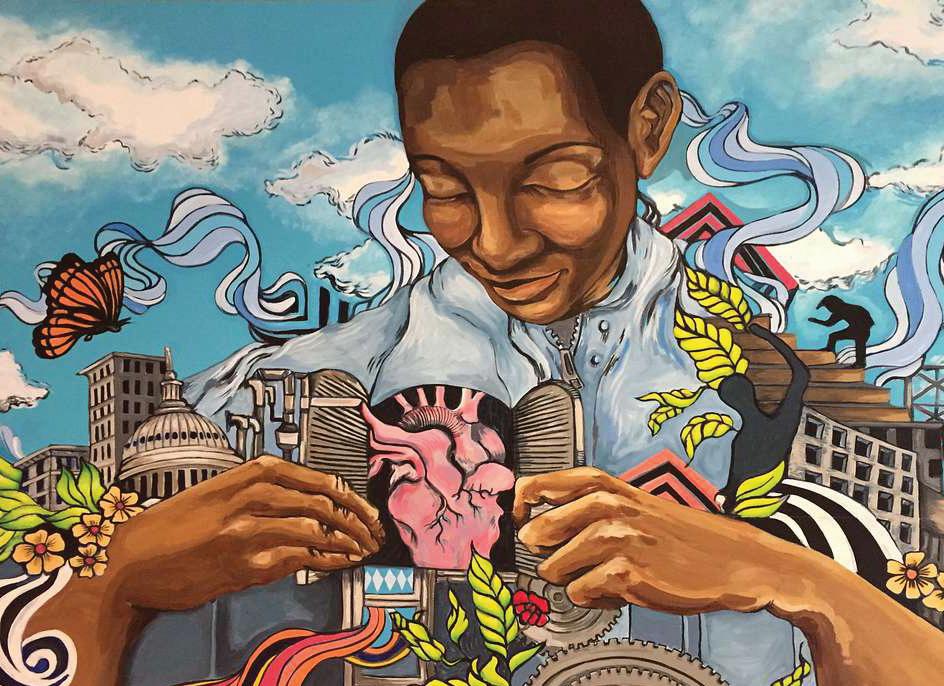
The Groundswell Mural Project at Ellis Island, a
the identities of immigrants in the 20th century.
into our community values, influencing our speech patterns, career choices, socioeconomic positions and music tastes. That history is the root of our community's internal divisions, perpetuating friction in the Black community that manifests as colorism, class division and the idea of an “authentically Black” person. Many stereotypes that Black Americans have internalized trace back to some point in history. During slavery and following its abolishment, federal and state governments systematically withheld education from Black people, contributing to the myth of Black intellectual inferiority.
Despite the barriers, many Black people educated themselves or fought for the Black right to education. Frederick Douglass, for example, taught himself to read and write by making friends with white kids asking them for lessons and reading books in secret during the night.
After slavery, education became a path for advancement within the Black community. However, the Black people who sought education became distanced from the community due to their perceived proximity to whiteness.
Those Black communities' internalization of the inferiority of Black intelligence led them to believe that the ability to speak
“proper” English and excel academically was “acting white.” The same ideology persists today with the Black community – deeming those who speak “proper” or display professionalism as white-washed.
This leads the Black community to fear that evoking their intelligence will invalidate their racial identity, which divides Black populations in schools into Black students who excel and those who do not.
W.E.B DuBois discusses and even advocates for this divide, famously stating, “The Negro race, like all races, is going to be saved by its exceptional men. The problem of education, then, among Negroes must first of all deal with the Talented Tenth.”
The Talented Tenth was DuBois’s idea that the top 10% of the Black population—at the time—would be ready to pursue higher education and harness the qualities of leaders to lead the Black population. This ideology of a small portion of Black people carrying the Black race is counterintuitive, as to grow as a community, the community must grow together. This discussion of a Black elitist group divides our community even more, expanding the gap between the wealthy and the poor.
The lack of societal mobility when deprived of education and resources
are not unique to the Black community. Collectively, during Industrialization, there was a systematic economic divide between the wealthy and poor due to a small group of people owning all the factories. Enabling the idea of a Black elite group would foster the same economic divide.
The historical tension surrounding Black advancement alters how the modern Black community views successful Black professionals, such as saying they have forgotten where they’ve come from or calling them “bougie” or “white.” Even today, Black people often walk a fine line between their identity and the white professional world, having to balance respectability politics and embracing their identity. Commonly, these professionals are isolated from the Black community for losing touch with their roots, when that is rarely the case.
In turn, more successful Black people judge low-income Black people for “not trying” or “being hood” when, in reality, systematic struggles are the root cause of their struggles. These perceptions within the Black community are counterproductive and distract from historical and systematic causes of poverty.
Blackness is not a monolith. Black is not an identity that needs policing. Black is not a single way of speaking, acting or living. Racist historical narratives cannot measure your Blackness. We, as a community, are diverse and talented, and it's time that we let go of societal labels that contain us.
“ Blackness is not a monolith. Black is not an identity that needs policing. Black is not a single way of speaking, acting or living. ”
We must uplift all Black people, including entrepreneurs, scholars, artists and more. To truly celebrate being Black, we must celebrate the full spectrum of the Black identity. Enabling the idea that there is one way to be Black detracts from our culture and creates division. Reinforcing the narrow definitions of Blackness deepens these divides. So, let’s change the narrative and reclaim Blackness without limitations. Black is a spectrum.

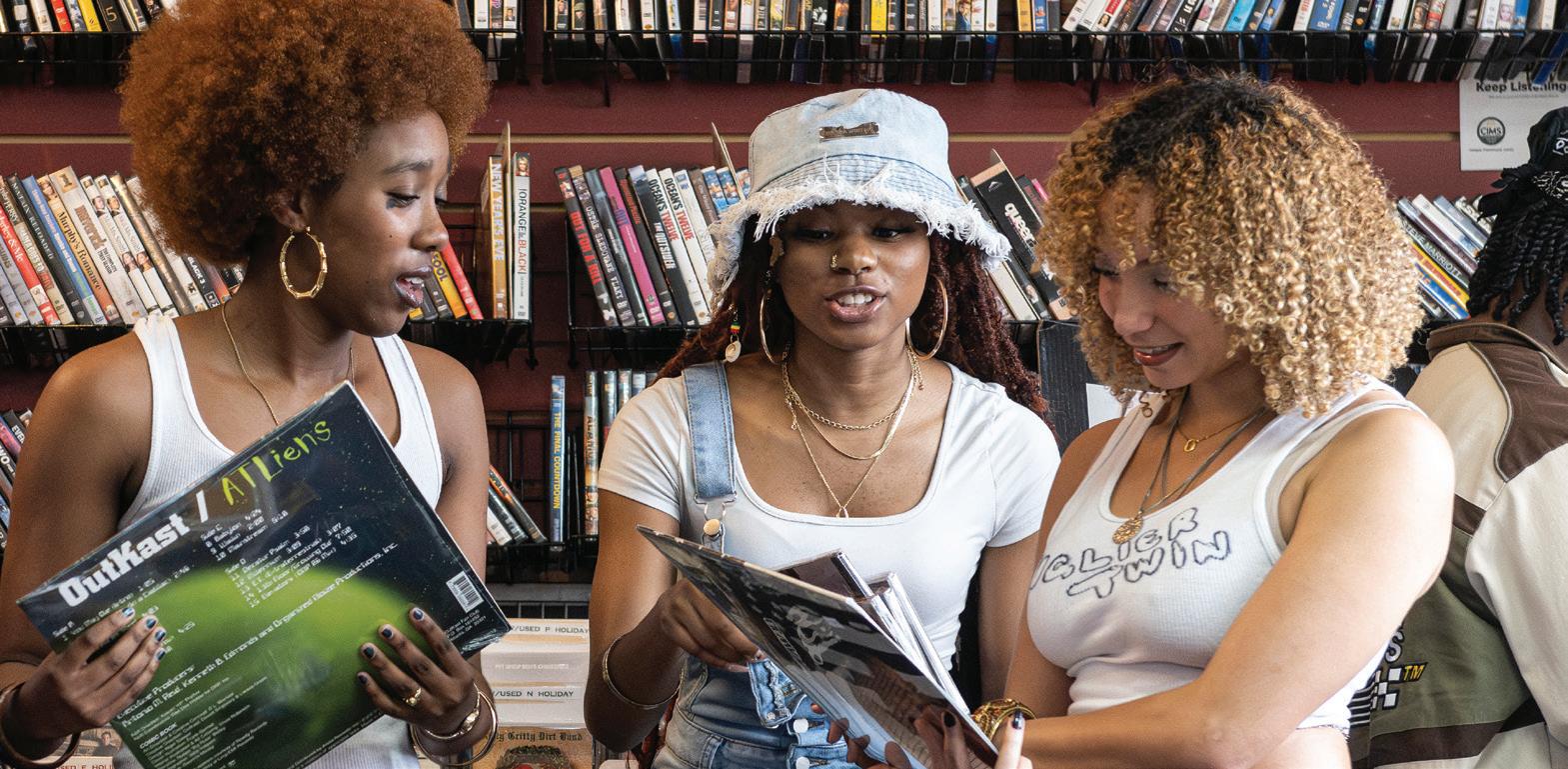





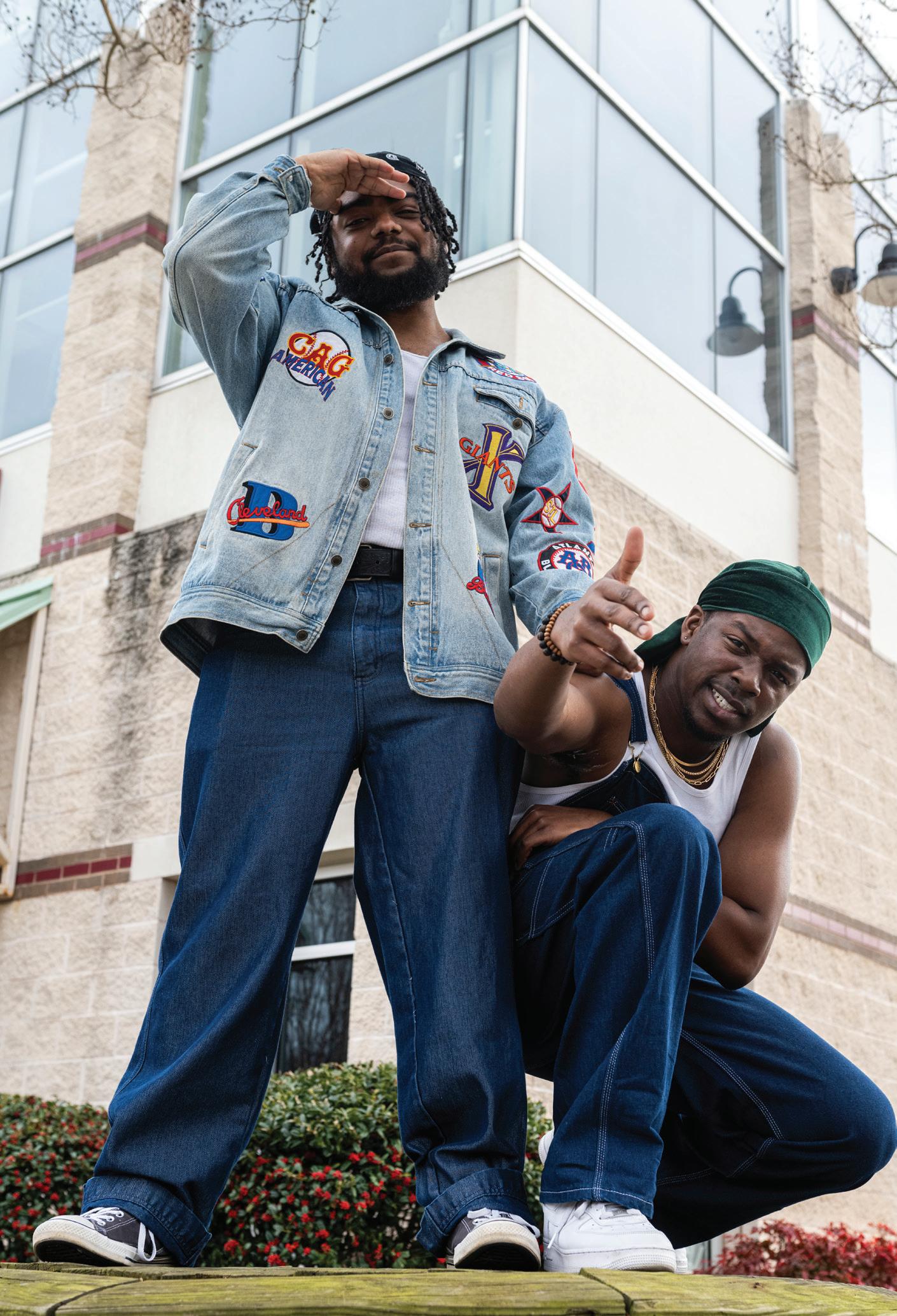



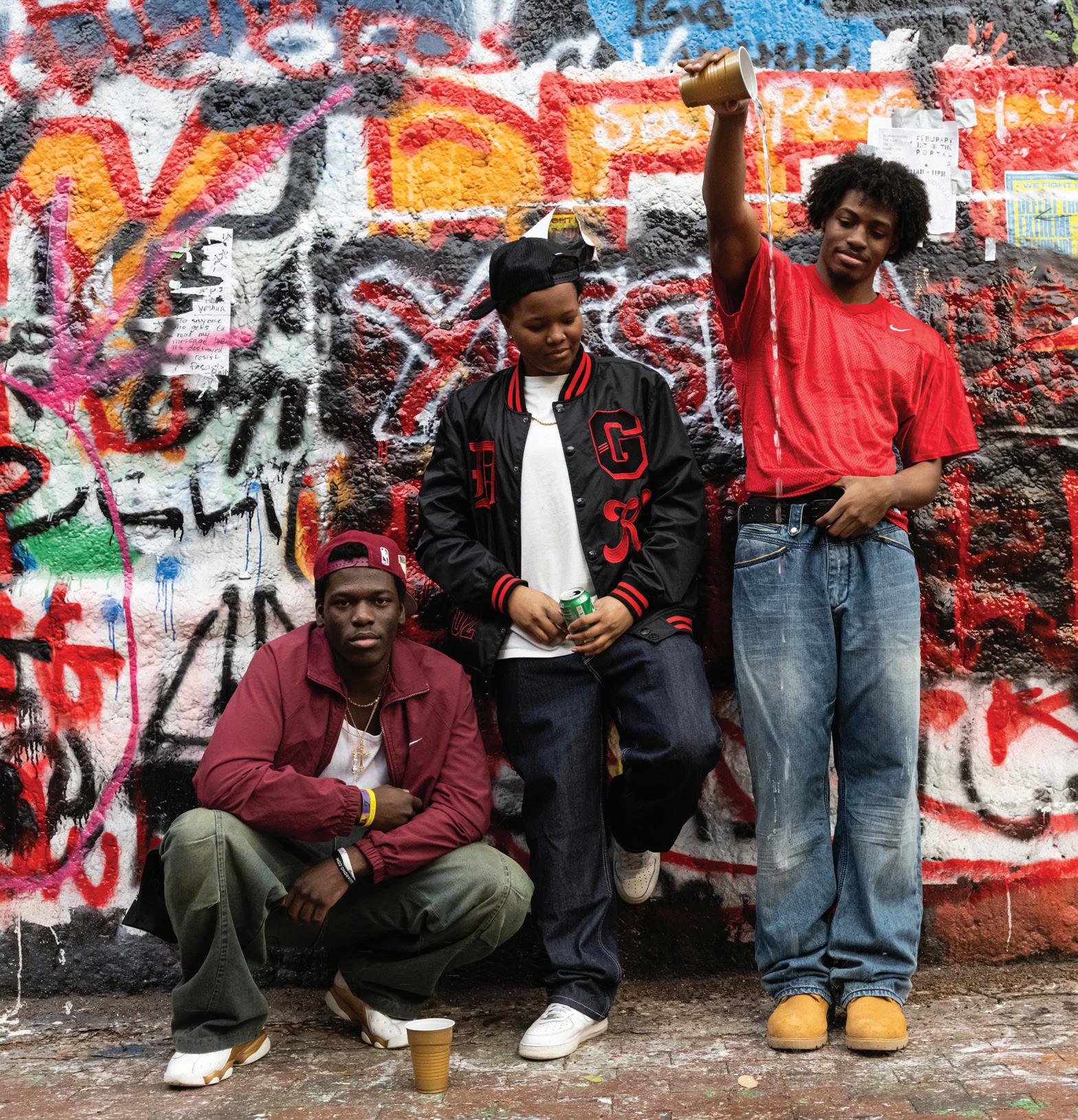


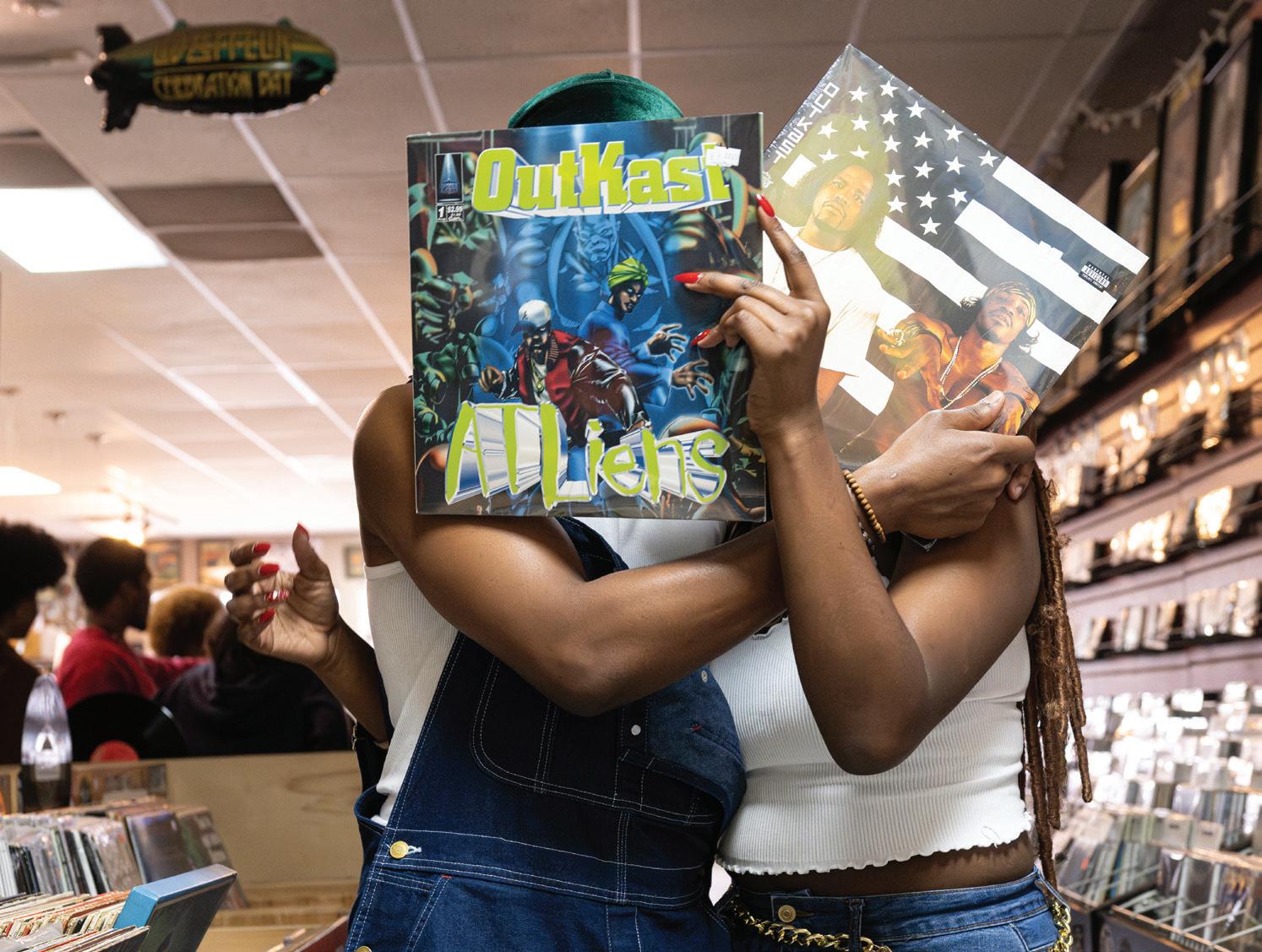

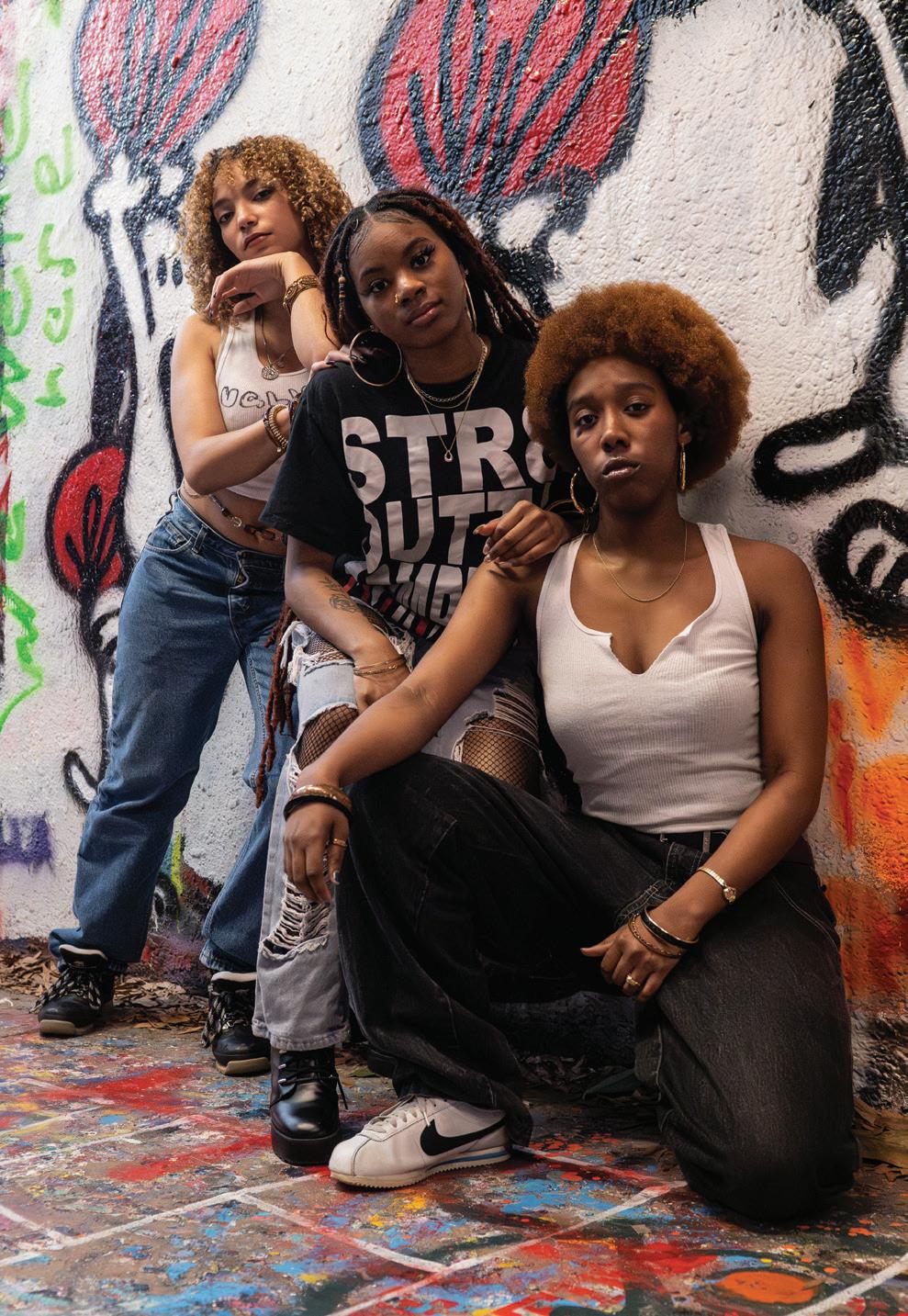










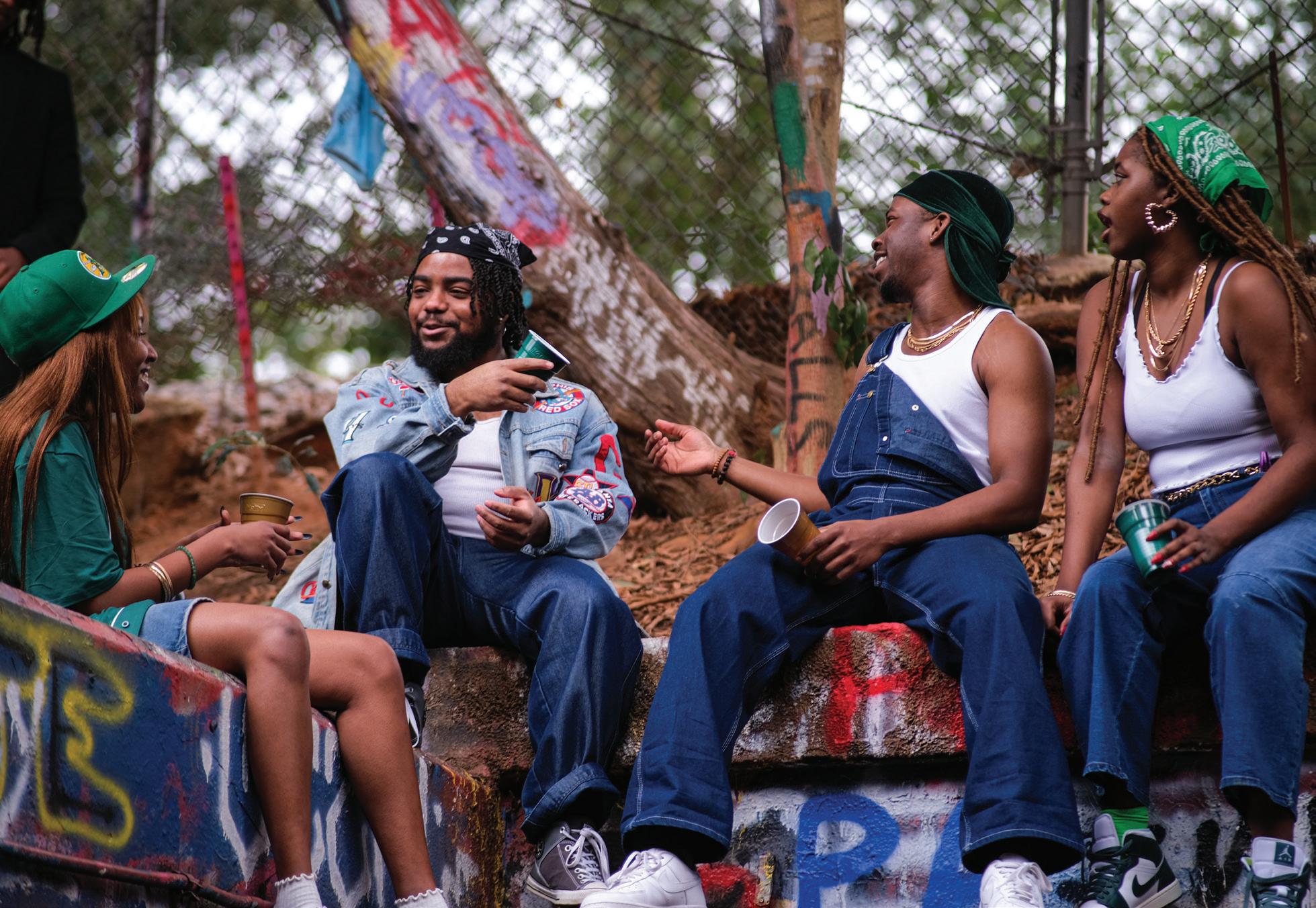







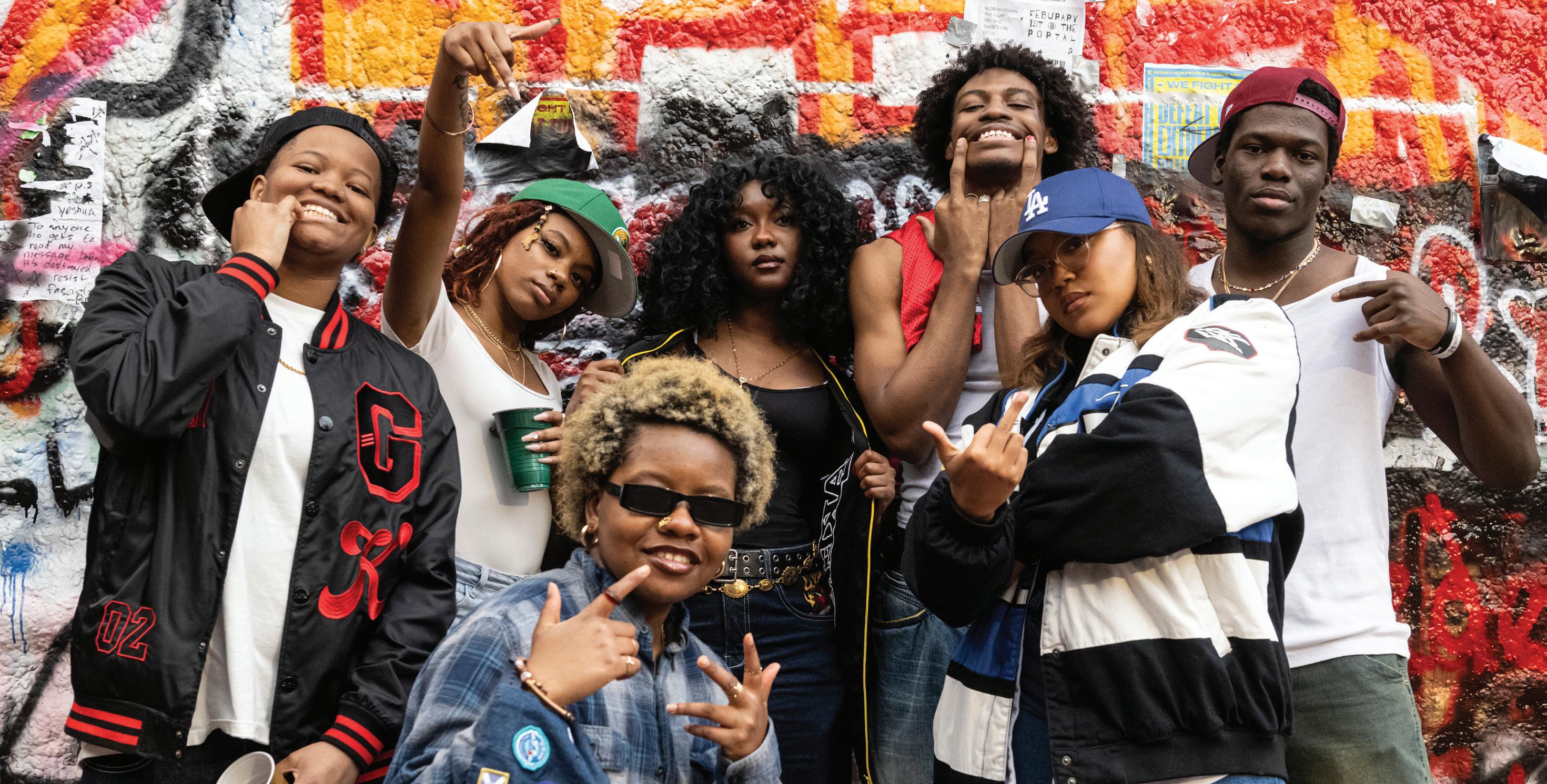




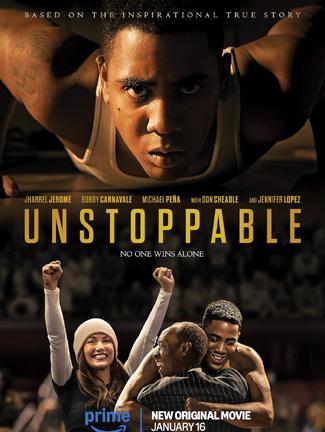
Kaela Belingon/ Photo Editor
Unstoppable is a sports drama that follows the true story of the one-legged wrestler Anthony Robles. Based on Robles’ autobiography, the movie is a coming-of-age story about how the athlete came out on top of every challenge faced both on and off the mat. With great performances by Jharrel Jerome and Don Cheadle, along with Robles himself as his own stunt double, this movie goes beyond what one might expect. Unstoppable’s portrayal of wrestling remains mostly faithful, capturing the action, the stakes and the atmosphere of the sport in a way that is as sensational as it is realistic. But, the movie isn’t just about chasing a wrestling championship. It explores the complete reality of Robles’ college years as he worked a part-time job, protected his family from his step-father’s abuse and clashed with his mother. It portrays masculinity and emotional vulnerability as they should be, depicting Robles as he’s caught between toxic and healthy masculine norms, the former represented by Robles’ stepfather and the latter his wrestling coaches, while touching scenes between him and his mother show the importance of emotional vulnerability. With Philadelphia hosting this year’s NCAA Division I Wrestling Championships, the very city where Robles won the collegiate championship, and NC State’s own Vincent Robinson a contender for the 125-pound championship, Unstoppable is a must-watch for young students, not only wrestling or sports fans. Also, UNC-Chapel Hill’s wrestlers get bodied. I hope that’s more than enough to convince you to watch it.

Blake Anderson/ Correspondent
In the context of “Oldie but Goodie,” Above by Mad Season is a standout. Despite being a short-lived project, Mad Season brought together key figures of the Seattle grunge movement from the late 1980s into the ’90s. The band featured Mike McCready, guitarist of Pearl Jam, and Layne Staley, lead singer of Alice in Chains, among others. Above is a well-crafted, articulate, and emotional album that soothes listeners with slow, sensual rhythms and vocals while also delivering the sharp, hard-hitting chords and riffs Pearl Jam fans have come to know and love McCready for. The Live at the Moore performance in Seattle, in 1995, is a testament to how great these artists truly were and still are to this day. Each member brought their own individual talent to the group, showcasing their skills without reservation. Layne Staley’s raspy and gritty voice weaves through the album, blending rock and blues in a unique way that immerses the listener in his raw and self-loathing lyrics. Mike McCready wields his guitar with prowess and discernment, utilizing it not only as a medium for creating sound but as a remembrance of the pain and passion the songs on Above embody. Mad Season was brought together by the shared experiences of drug use, rehab and grunge. While their time as a band was brief, their music remains a powerful and timeless piece of the era, resonating with listeners even today. Above stands as a testament to their talent, emotion and artistry cementing Mad Season's legacy in the history of rock.

400 DEGREEZ JUVENILE
B.O.B (Bombs over baGHDAD) outkast
I'LL TAKE YOUR MAN '97 MIA X
playlist by Nubian Message Staff Nubian's favorite songs from the 99 and the 2000s STILL TIPPIN'
PULL OVER
UP
MAKE 'EM SAY UGH MASTER P
POPPIN' MY COLLAR tHREE 6 MAFIA
CHARLIE WHOP!!
ROCK YO HIPS
MAGNOLIA SHORTY
CRIME MOB
WHERE DEM DOLLAS AT GANGSTA BOO
MIND PLAYING TRICKS ON ME GETO BOYS
LEMONADE
GUCCI MANE
I NEED A HOT GIRL HOT BOYS, BIG TYMERS
CHICKENHEAD
SCOTTY
PROJECT PAT, LA CHAT
D4L

If you’ve attended a public school like me, you’ll know they need help; but in the same breath, you’ll know these schools are crucial. The U.S. needs to uplift and support public schools, rather than abandoning them.
Everyone who attends a public school has a moment where they say — "oh, it really is that bad." For me, it was when my teacher had to cover a crack in the floor with Tupperware to avoid kicking up asbestos. For others, it may be a teacher resignation surge in their senior year.
Let’s not sugarcoat it: American public schools have problems. From a structural standpoint, The American Society of Civil Engineers gave America’s public schools a grade of D+, with 31% of America’s public schools having below-average plumbing and 30% having below-average heating.
They also aren’t doing particularly well compared to their private school counterparts. According to USNews, private schools tend to have better graduation rates and test scores than public schools.
Public schools definitely have problems, so how do we solve them? Part of the Trump administration’s solution seems to be dismantling the Department of Education.
In a video, President Donald Trump said, “One other thing I'll be doing very early in the administration is closing up the Department of Education in Washington D.C. and sending all education and education work and needs back to the states.”
Republicans say it’s about states’ rights, but have shown support for school voucher programs, where the state pays for students to attend private schools, so it’s hard to believe they actually intend to improve their public education.
Besides, the Department of Education does not directly control U.S. schools. Per their website, the Department of Education takes a “leadership role in the ongoing national dialogue over how to improve the results of our education system for all students.” The department also distributes funds to public schools, but states and districts have most of the control.
Sending education back to the states wouldn’t help because federal support is vital for public schools. Dr. Jenn Ayscue, an associate professor of education at NC State, spoke about how federal funding helps public schools.

“The federal government does provide some funding for education to states and districts, and while it's smaller than the proportion of funding from states and local districts, it's important. It supports programs for low-income students, supports programs for multilingual learners, students with disabilities, firstgeneration college students,” Ayscue said.
Other school types, like private schools, have fewer guardrails protecting marginalized students — in particular, students with disabilities. According to Education Week, less than 2% of students with disabilities attend private schools. In fact, private schools often partner with public school districts for co-teaching in special education programs.
Outside of that, private schools don’t have to accept everyone, meaning they can discriminate in some ways. I don’t want my tax dollars supporting schools that can reject students for personal characteristics. This is the biggest problem I have with the administration’s plan; it completely discounts the point of public schools: accessible education for all, regardless of religion, sexuality, gender or socioeconomic status.
That’s part of the beauty of public schools. They put all kinds of people together to learn and grow together. Sure, students
create cliques and exclude others, just like all kids do. But it’s that opportunity that makes room for understanding later in life.
Just as a concept, public schools are worth protecting. Everyone working together to ensure our next generation isn’t walking into life unprepared is something that should be protected, not replaced. Plus, considering the other options are private schools and charter schools – the latter of which is highly controversial – public schools are a crucial option.
So, what should we do to improve public schools? The most important element is improving funding.
“Well, first and foremost, I think investing in public education is critically important,” Dr. Ayscue said. That’s the crucial element; sure, we can improve public education in a myriad of ways, but investing in our nation’s future is the bare minimum. More spending on public education improves graduation rates, especially among low-income students.
Detractors to public education often use the defeatist, circular argument that public schools underperform; therefore, we shouldn’t fund them. However, studies show that funding public schools works, especially if you spend it on instruction and student support.
Oh, and funding to improve the run-
down buildings might help, too. Personally, working with functioning plumbing and heating systems would help me learn. Showing the buildings that house our students and teachers a little respect would be nice.
Another critical step is understanding why students are struggling. Rather than immediately assuming public schools are inherently the problem, we could at least see if there are other explanations.
“It's also important to think about the ways in which students are marginalized within schools —whether that's through inequitable and unjust disciplinary practices or identification for special education services or gifted and talented programs— and think about how all of those different processes and programs work so that they can be more equitable and supporting of students,” said Dr. Ayscue.
These reforms, along with basic funding, would help improve student success. I’m not saying public schools are perfect, but shouldn’t we make the bare minimum effort before giving up?
I won’t pretend every experience I’ve had in a public school was perfect; those schools have been the site of some pretty unpleasant experiences. I’ve eaten lunch next to dead cockroaches, heard about teachers making Rube Goldberg machines to catch rats and seen bathroom stall doors ripped off their hinges. But if you look beyond the ugly facade, there’s an earnestness there.
I wouldn’t trade my public school years for anything. They’re full of teachers who’ll fight tooth and nail to make sure you succeed, who want to prepare students who may not otherwise have gotten a chance and all without having to shell out around $10,442 a year, the average tuition for private school in North Carolina.
Public schools gave many of us an education, but they also taught us how to live. My school district offered courses showing a future with or without college. My high school offered programs to help students learn how to apply for college. These resources are vital to many students’s life goals.
Public schools may not be the greatest, but they have a heart. They’re schools that serve everyone, and that virtue is more important than ever today. Destroying public schools destroys that dream.

Kristopher porter Layout Designer
Everyone seems to be raving about the 67th annual Grammy Awards—if you didn’t watch the star-studded award show, you heard about it.
The award show was held at the Crypto. com Arena in Los Angeles, California, hence the large emphasis on raising money for those impacted by the LA wildfires. There were even commercial breaks solely dedicated to the wildfires.
From the performances to the acceptance speeches, to the looks served throughout the night, the Grammy’s felt like the party of the decade. And it's like Issa Rae said, I’m rooting for everyone Black.
Doechii
Doechii took home Best Rap Album beating out major names in the industry like J.Cole, Eminem and Future. She became the third woman ever to win in this category, joining Cardi B, who took home the award in 2019 and Lauryn Hill who won in 1997.
The category was created in 1995, and her winning the award showcases her success and the arrival of a new rising star. According to Rolling Stone, her album “Alligator Bites Never Heal” was the ninthbest album of 2024.
The album spawned hits like “NISSAN ALTIMA,” “CATFISH” and “DENIAL IS A RIVER.” Doechii is bringing a transformative sound and flow to the rap genre. This win was obviously deserved and if she didn’t win, I would have snatched the award for Doechii anyway. The category as a whole was weak outside of Doechii and Future’s albums, so this shouldn’t be at all controversial.
“Doechii is bringing a transformative sound and flow to the rap genre. This win was obviously deserved and if she didn’t win, I would have snatched the award for Doechii anyway.”
Furthermore, none of the albums outside of Doechii and Future’s albums were even selling, streamed or talked about to the same level as theirs. She is supremely talented, has worked extremely hard at her craft since 2016 and has grown a fanbase that appreciates her ever-growing artistry. Her performance at the Grammys was amazing and left the audience gagged, proving she deserved to win. She performed “CATFISH” and “DENIAL IS A RIVER" as part of a Best New Artist showcase. She wore two distinct outfits during her performance. She had on a gray suit with shorts for “CATFISH” and then transitioned to a white two-piece with red and black for “DENIAL IS A RIVER.” Her background dancers wore gray suits with shorts. This performance is iconic because not only did she win but she stayed true to herself.
Users on TikTok and Instagram went as far as to claim that she is an industry plant, wasn’t relevant or culturally impactful, and that her album only sold eleven thousand in the first week of album sales, so she wasn’t deserving of the award.
The amount of disrespect she received shows how Black artists, especially Black women, have to work harder to be recognized compared to their male peers. So for her to overcome the outside noise, and win this award as a first-time Grammy nominee is huge, and it gives hope for other female rappers in the industry to win the award in the future.
Kendrick Lamar won five Grammy awards, sweeping all of the categories he was nominated for which is very impressive considering it was for one singular song – “Not Like Us.” He won Best Music Video, Rap Song and Rap Performance and took home Song and Record of the Year. He made history with his song Not Like Us becoming the first diss track to win at the Grammys.
Lamar is also the second rap artist to win Song and Record of the Year after Childish Gambino’s “This is America” in 2019. This is a huge milestone and testament to how influential “Not Like Us” is. Kendrick broke barriers and won, despite the Grammy’s history of excluding rappers from these categories.
Many are saying that the awards Song and Record of the Year should have gone to other artists or that he only won because the song is entirely about Drake. But really, the Compton-born rapper truly deserved these wins as this song singlehandedly defined 2024 in music, and was truly inescapable. The streams speak for themselves.
Everyone at the award show was singing along to it, even Beyoncé, which alone shows how big the song is. This is probably the biggest diss track of all time. Kendrick winning shows that rappers have a chance to win in the big categories and that rap needs to be taken more seriously at the Grammys.
Beyoncé
Beyoncé won 3 Grammys for her newest album "Cowboy Carter," including Best Country Duo with Miley Cyrus, Best Country Album and the most coveted award – Album of the Year. She made history as the first Black woman to win Best Country Album, and Country Duo, breaking a 26-year drought of a Black woman winning Album of the Year. Beyonce joins Natalie Cole, Whitney Houston and Lauryn Hill as Album of the Year winners. This was also Beyoncé’s first Album of the Year win in her over 20-year music career.
The wins were shocking, but a welldeserved moment for Beyoncé. This is redemption for her, but not everyone is as thrilled about this as I am. The Jay-Z speech from The 66th Grammy Awards was brought up with allegations that he bought the award. Conversations about streams, sales, relevancy and the number of people credited on the album were points that people made to justify her not being worthy of the award.
I know people are saying that she robbed artists like Billie Eilish and Charli XCX of the award. To them I say: your artist did not make a body of work like "Cowboy Carter." Album of the Year is not only dictated by sales, but by cultural impact and the album's quailty, and "Cowboy Carter" checks every box. We know that she should have more than one Album of the Year, but this win cements her legacy as one of the best to ever do it.
Beyoncé winning Best Country Album
is a huge statement to country as a genre, because all year, people kept saying that “Cowboy Carter” was not a country album. Not to mention, she did not receive a single nomination at the Country Music Awards. Even though Beyoncé did say it’s a “Beyoncé album” and not a country album, it is still very much a country album. She even said the album was born from her controversial 2016 Country Music Awards performance with The Chicks. The album featured country legends such as Willie Nelson and Dolly Parton along with Black country artists like Shaboozey and Tanner Adell. This album was all about the reclamation of country music and paving the way for Black Country Artists. For Beyoncé to win Best Country Album and Album of the Year was historic and she deserves all the flowers.
“This album was all about the reclamation of country music and paving the way for Black Country Artists. For Beyoncé to win Best Country Album and Album of the Year was historic and she deserves all the flowers.”
I know that the Grammys aren’t perfect but there was a different vibe with them this year. More diversity was recognized and highlighted. The speeches were more direct to the state of the world and it just felt more grounded in reality. When it comes to the three artists that I talked about, they are talented and they should not be torn down because they won over your favorite artists. You may not like them or their music, but being racist toward them doesn’t change that they made history.

Gire NYARA Correspondent
In recent years, Gen-X has shifted toward lifestyle trends rooted in conservatism, with the rise of aesthetics like the ‘soft girl’ and ‘trad wife.’ Hypergamy — dating and marrying people in higher socioeconomic classes — has been woven into today’s pop culture.
The idea of having a man pay for your lifestyle is heavily popularized in Black feminine media, especially through music. There is a clear disconnect in that the celebrities promoting these ideals are not average Black women.
What does this rise in conservative relationship styles mean for the average Black woman? It poses significant dangers.
In recent years, a growing conservative movement within the Black community has gained traction, emphasizing traditional gender roles, patriarchal family structures and a rejection of progressive ideals.
While some may argue that conservatism offers a return to stability and moral values, its implications for Black women are deeply troubling. This ideological shift threatens the autonomy, safety and well-being of Black women.
There are three reasons why the rise of conservatism in the Black community is dangerous for Black women: its correlation with higher rates of domestic abuse, its disregard for Black-specific social issues, and the unsustainability of the "kept woman" lifestyle in modern society.
One of the most alarming consequences of conservatism’s rise in the Black community is its reinforcement of patriarchal structures that contribute to domestic abuse. Traditional conservative ideologies emphasize male authority and female submission, which can create environments where abusive behavior is tolerated, justified and normalized. Research shows that adherence to traditional gender roles correlates with higher rates of domestic violence and allows power imbalances that have left women vulnerable to mistreatment.
In many conservative spaces, domestic abuse is downplayed or reframed as a private matter rather than a societal issue. Women are often encouraged to "submit" to their partners, expecting their obedience to result in stable relationships. However, this approach ignores the reality that abusers do not change simply because their partners comply with their demands. Instead, it emboldens perpetrators and leaves victims without support. Furthermore, conservative rhetoric discourages divorce, often painting it as a failure rather than a necessary escape from harm. In Black religious communities, which are often intertwined with conservative ideology, women are sometimes pressured to endure abusive relationships for the sake of reputation or righteousness. This creates a cycle where women are expected to sacrifice their well-being to uphold traditional family structures, making it even harder for them to seek help or leave dangerous situations.
“This creates a cycle where women are expected to sacrifice their well-being to uphold traditional family structures, making it even harder for them to seek help or leave dangerous situations.”
Conservatism in the Black community often ignores or minimizes the systemic issues that disproportionately affect Black people, especially Black women. Conservative ideology often preaches personal responsibility as the primary solution to economic and social struggles. This dismisses the impact of systemic racism, economic inequality and gender discrimination.
This is particularly harmful to Black women, who face the compounded effects of racism and sexism in their daily lives. Issues like the wage gap, healthcare disparities and racialized violence require systemic solutions, yet Black conservatism frequently aligns with political movements that oppose policies designed to address these inequalities.
Conservatives often reject social welfare programs, affirmative action and police reform efforts — all of which have been critical in helping Black women navigate systemic roadblocks.
Similarly, Black conservative spaces often adopt a rhetoric that blames Black women for the struggles within the community, suggesting that feminism and career ambition have "ruined" the Black nuclear family. This narrative ignores the historical and systemic factors that have contributed to family structures and economic instability, instead placing undue responsibility on Black women while absolving men and external forces of accountability.
Additionally, Black conservatism frequently aligns with broader right-wing movements that are openly hostile to social justice causes such as Black Lives Matter, reproductive rights and gender equity. By aligning with conservative politics, many Black conservatives support policies that actively work against the interests of Black women, such as restrictions on abortion access, which disproportionately harm Black women due to existing healthcare disparities.
The "kept woman" or "trophy wife" lifestyle, popularized on social media, has many women aspiring to stay at home while being finiacially supported by their husbands. While this model is appealing to some as a means of escaping workforce discrimination and financial burdens, unfortunately, it is unsustainable in the current economic climate.
In 2025, the cost of living continues to rise, making it nearly impossible for most single-income households to maintain a comfortable lifestyle. According to the MIT Living Wage calculator, a household of three (one working adult) requires $81,245 for a livable annual net income in Wake
County, NC.
Housing, healthcare, education and childcare expenses have increased significantly, meaning that relying solely on a husband's income is a financial risk that most families cannot afford. Even among wealthier couples, unexpected crises can quickly upend financial security, leaving women who have relinquished their financial independence especially vulnerable.
The "kept woman" lifestyle assumes that men will always be reliable providers, yet statistics show that economic instability disproportionately affects Black men due to employment discrimination and other systemic barriers. When a household’s entire financial stability depends on one person, it places Black women in an uncertain position should their partner lose their job or become ill.
Being raised in a traditional African household, this lifestyle is what is familiar to me, but it would be ignorant of me to ignore its reality. The rise of conservatism in the Black community is not just a political shift—it is a dangerous regression that threatens the safety and autonomy of Black women.
By reinforcing patriarchal structures that enable domestic abuse, disregard systemic issues that disproportionately harm Black women and promote an economically unsustainable lifestyle, conservatism leaves Black women in a vulnerable position. Instead of idolizing these types of relationships, which are too good to be true, I would advise Black women to shift their energy into self-development through education and entrepreneurship. If you want a certain lifestyle, it mustn't be contingent on your relationship with another person.
All in all, women have the freedom to choose whatever lifestyle may suit them best, but they must be fully aware of the beliefs they are rooted in.

Emma
Hamrick Staff Writer
Pre-game thoughts — I hate the Super Bowl. Honestly, I might even hate football as a whole at this point, but not as much as I hate the Kansas City Chiefs. I do not want them to win the Super Bowl, or even compete in it at all, but what can you do? The lead-up to Super Bowl LIX has been a mess, given that the conference championships were disappointing, at best. The Eagles beat the Commanders to win the National Football Conference (NFC) Championship. Then the Chiefs beat the Buffalo Bills to win the American Football Conference (AFC) championship.
“ Honestly, I might even hate football as a whole at this point, but not as much as I hate the Kansas City Chiefs. ”
I didn’t care too much about the NFC championship but I was really hoping for the Bills to win the AFC title. The Bills have been one of my favorite teams to watch this season. Whether that is because one of my close friends is a huge Bills fan, or because I love Josh Allen. Josh Allen truly is one of those football players who seems like a decent guy. I was quite happy to see him take home the MVP award at NFL Honors, so there was that.
Anyway, I digress. The biggest reason that I hate the Chiefs is because of their fanbase. I don’t necessarily have an issue with the team itself, barring a few of the players. It’s the fact that so many people have become bandwagon Chiefs fans for one of two dumb reasons: Patrick Mahomes or Travis Kelce.
I understand following a specific athlete and cheering for whichever team they play for, but when you would do anything for that athlete and forgive whatever they may do, that’s where I draw the line.
Mahomes is an annoying, whiny loser. I would use harsher words if this wasn’t a school publication. Every clip I have seen of him makes me want to pull my hair out. I can’t speak to his personality or how he is as a human in general, but as a quarterback, I don’t like the guy. Mahomes seems exceptionally full of himself and gets upset when calls don’t go his way. He gives the impression that he thinks he is untouchable. I can’t stand his ego.
Travis Kelce's popularity has skyrocketed over the last few years because of his relationship with Taylor Swift. Before anyone gets mad: of course, he was popular before dating Taylor Swift, I know that. But the Swiftie army has become the latest addition to the Chief's standom… and Swifties were already annoying before they started watching football. With that being said, Travis Kelce isn’t as annoying as Mahomes and he is a damn good tight end. He just happened to adopt an annoying fanbase.
Another thing about Super Bowl LIX, President Donald Trump will be in attendance, becoming the first ever sitting president to attend the Super Bowl… sick. But what did the teams have to say about this?
Travis Kelce said that it was a “great honor.” A great honor… seriously? He also said that America is the “best country in the world” and that “having the president there” is “pretty cool.” Bro is giving the most watered-down answer he could muster because he doesn’t want to piss anyone off. Well… it had the opposite effect, and now he is facing backlash for his “diplomatic answer.”
Patrick Mahomes, shocker, said something very similar, “It’s always cool to be able to play in front of a sitting president, someone that is at the top position in our country.” Once again, very diplomatic, very boring. I understand that these guys don’t want to say anything controversial, but they don’t have to be spineless.
A perfect example would be what Eagles offensive tackle, Jordan Mailata, said,
“That's cool but Donald is not on that field. That's cool but again that's blocking out the noise. What am I going to do thinking about Donald Trump? How is that going to make me win the game?” He gave an apolitical answer that didn’t offend anyone or anything. All he did was say that he was going to focus on the game. Or you could do what the Eagles quarterback, Jalen Hurts (a true king), did. When asked if Trump’s attendance would bring any “added pressure” he responded with “no ma’am” and a smile. He didn’t say anything rude or hurtful but he was still able to show the audience where he stands on the subject, with a little bit of sass. Also, it doesn’t hurt that he’s the first NFL player to have an all-women management team.
Post-game thoughts — regardless of who was in attendance or what even happened during the game, there are only four things that I cared about: The Puppy Bowl, the commercials (although they were overall very lackluster this year), Kendrick’s halftime show and what color Gatorade was poured on the winning coach.
But on a real note, here is the rundown. I am so glad that the Eagles won, they truly deserved the win. Hurts played spectacularly, as usual, taking home the MVP title. On the other hand, Mahomes completely choked during the first half of the game. The cameras caught him literally pouting. Kelce barely contributed. He had a whopping 39 receiving yards and none of those were for a touchdown.
Cooper Dejean was one of my favorite players to watch this game. Dejean is a rookie cornerback for the Eagles and absolutely ate down. He got his first-ever interception and returned it for a pick-six, AND got his first touchdown as well. A great birthday for the 22-year-old.
Feb. 9 wasn’t just Dejean’s birthday, but also his teammate, running back Saquon Barkley’s birthday as well. Although that is already crazy enough, it gets crazier when you look at their numbers. Dejean is number 33 and Barkley is 26. When you add those two together you get 59 aka Super Bowl LIX. The Eagles win was
written in the stars.
Last, but certainly not least, the halftime show. There is so much to unpack about Kendrick Lamar’s halftime show that I would need a lot more time to break it all down. I will do what I can.
He began his performance with a phrase that doesn’t appear anywhere in his discography, I think it must be in reference to America’s recent change in power: “The revolution is about to be televised. You picked the right time, but the wrong guy.”
The entire performance had references to both video games and the United States of America. All of the dancers on stage were Black, wearing red, white or blue outfits. Then there was Samuel L. Jackson dressed as Uncle Sam popping in hereand-there with commentary that lent itself to the fact that living in the US nowadays is akin to playing a game, particularly for Black people. Jackson said that Kendrick’s performance of “squabble up” was “too loud, too reckless, too ghetto!” Then followed up with, “Mr. Lamar, do you really know how to play the game? Then tighten up!”
Directly after this, Kendrick sang “HUMBLE” with his team of backup dancers making the image of an American Flag with a split in the center. Whether that was about the current political climate in America, or something else, I don’t know.
Then there was Serena Williams’ crip walking during “Not Like Us,” reminding us of the time when she had received huge backlash for doing that same dance move after winning gold at the 2012 London Olympics.
I thought that Kendrick Lamar’s halftime performance was not only incredibly well done, from a musical and a production standpoint, but it also stood for more than just a diss against Dr*ke. I would go as far as to say it is my favorite Super Bowl performance to date.
Maybe I don’t hate the Super Bowl, I think I just hate the Chiefs.


